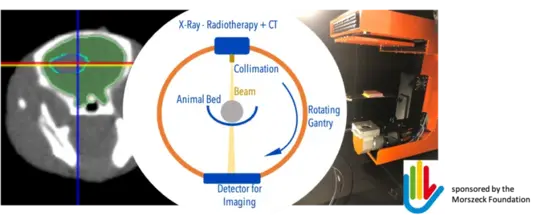Morszeck Preclinical Trial Unit (PCTU)

Dr. Mareike Roscher
Head of Morszeck PCTU
At the Morszeck Preclinical Trial Unit (PCTU), we test novel radiotherapeutic treatment strategies in animal experiments collaborating with various working groups at the DKFZ and other research centers. Furthermore, clinical studies are synergistically complemented by detailed analysis of the biological mechanisms that determine clinical treatment parameters.


Our Research
In addition to basic research, the DKFZ's diverse research landscape also addresses preclinical and clinical issues, such as radiotherapeutic applications. The integration of our unit paves the way for optimizing therapies by elucidating the molecular basis of the radiation response and possible resistance mechanisms. It will also allow innovative studies to be conducted in which radiotherapy is combined with pharmaceuticals. This may be necessary when these agents still have an unknown risk profile with regard to their interaction with radiation, but are intended for combined clinical use in the future. The PCTU thus offers the unique opportunity to advance interdisciplinary and customized preclinical and prospective clinical research in the field of radiotherapy.
Methods and Technologies
Similar to clinical radiotherapy in patients, we perform image-based therapy planning in our preclinical unit. For this purpose, anatomical images of the body, in particular of the area around the tumour, are obtained using computed tomography (CT). For improved imaging of soft tissue tumours, we are addtionally equipped with a 1T small animal magnetic resonance tomograph (MRT), whose images can be fused with those of the CT. These anatomical and/or functional images allow precise delineation of the tumour volume and organs at risk. This way, the radiation field and the angles from which the radiation is delivered can be determined with maximum protection of healthy and sensitive tissues.
In addition, the acquired CT images are used for correct positioning during fractionated radiotherapy (image-guided radiotherapy, iGRT). Fractionation means that the total dose of radiotherapy is divided into several equal daily doses. To verify the accuracy of the treatment, the tumour and organs at risk can be visualised using cone beam CT prior to each radiotherapy session and compared with the reference image. Any necessary changes in positioning can be identified and carried out to ensure that only the target regions are irradiated.
For precise radiation planning, we can also use data sets acquired at the Core Facility for Small Animal Imaging using MRI (field strength 3T or 9.4T), PET/CT or SPECT/CT, respectively.
A standardized recording of experimental data is essential for comprehensibility as well as auditability and is therefore as important as the experiments themselves. For this purpose, RadPlanBio is used as a data management system and is also made available to our collaborators.

Contact for experimental planning and consulting
We are happy to support you with:
- Project planning
- Application for animal experiments and funding as well as subsequent amendment of methods
- Pilot/feasibility studies
- Image-guided precision radiotherapy
- Scientific evaluation of the results
- Writing reports and publications
Please contact us at: pctu(at)dkfz-heidelberg.de
Get in touch with us


Rosemarie Euler-Lange
Bioengineer